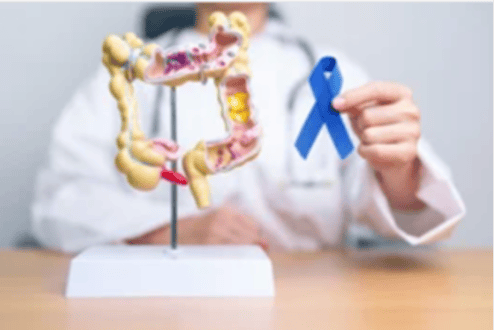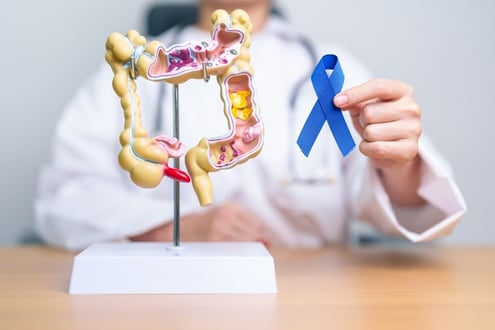Treatments for Colorectal Cancer
How do doctors decide on a treatment plan?
Doctors base their treatment recommendations on several factors, including:
- the stage of your cancer
- the subtype based on pathology
- additional test results, including biomarkers
- how fast the cancer is growing or how likely it is to spread
- whether the cancer is newly-diagnosed or has recurred after one or more treatments
- your overall health
Make sure that you receive a copy of your records. Ask your doctor to explain your diagnosis, test results, pathology report, stage, prognosis and treatment recommendations in terms that you can understand. This will allow you to work with your doctor to choose a treatment plan that is right for you.
Most colorectal cancer is treated with one or more of the following treatments. Every treatment has potential risks and side effects. Before any new treatment or surgery, make sure your healthcare team tells you about what to expect.
Surgery
Treatment for colorectal cancer typically involves surgery.
Early-stage colorectal cancer
Surgery for early-stage colorectal cancer may include:
- Polypectomy (polyp removal) is used to completely remove small cancers contained within a polyp during a colonoscopy.
- Endoscopic mucosal resection (removing polyps and surrounding tissue) allows doctors to remove larger polyps and a small amount of lining of the colon during a colonoscopy.
- Minimally invasive or laparoscopic surgery is used to remove polyps that cannot be removed during a colonoscopy. During laparoscopic surgery, small incisions are made in the abdominal wall so that the surgeone can insert cameras to help see the colon and instruments to help remove the cancer. Polyps are removed as well as a part the part of the colon that contains the polyp, and nearby lymph nodes through these incisions.
More advanced cancer
Surgery for more advanced colon cancer may include partial colectomy to remove the part of the colon that contains the cancer and normal tissue on either side of the cancer. A partial colectomy can often be done using a laparoscope, but sometimes open abdominal surgery is required.
Often, after removing the cancer, the surgeon can reconnect the healthy portions of the colon. When it is not possible to reconnect the healthy portions of the colon, the surgeon creates a hole in the wall of the abdomen called an ostomy. Ostomies allow stool to be removed from the body into a bag that fits securely over the opening. Sometimes the ostomy is only temporary, and after time the ostomy can be reversed. However, in some cases it may be permanent.
Very advanced cancer
- If the cancer has spread only to the liver or lung, doctors may recommend surgery in combination with other treatments such as chemotherapy.
- For people with very advanced cancer or overall poor health, surgery may be used only to relieve a blockage of the colon or to improve symptoms such as bleeding or pain.
Considerations for people with inherited mutations
For people who have an inherited mutation linked to very high risk for colorectal cancer, more extensive colectomy surgery may be recommended to treat their cancer and prevent new cancers from developing. These surgeries include:
- Total proctocolectomy with Ileal Pouch and Anal Anastomosis (TPC IPAA) involves removal of the colon and rectum but spares the anal sphincter. People who have this surgery may remain continent and are able to control bowel movements. The surgeon uses a portion of the small intestine to create an internal pouch, which stores waste until a bowel movement.
- Total abdominal colectomy with ileorectal anastomosis (TAC IRA) involves removal of the entire colon but spares the rectum. Not all people are candidates for this surgery, which leaves the risk for rectal cancers.
- Total proctocolectomy with permanent end ileostomy (TPC EI) removes the entire colon, rectum and anus and creates an ostomy opening at the end of the small intestine.
Get notified when updated information becomes available.
SIGN UP FOR CONTENT UPDATESWatch our Webinar
GI Cancer Experts Discuss Risk, Screening, Prevention and Treatment
In the News
Study : Exercise may delay the return of colon cancer and help people live longer
People who participated in a structured exercise program following completed treatment for colon cancer experienced more time without cancer growth and lived longer than those...
Chemotherapy
Chemotherapy for colon cancer is usually given after surgery if the cancer is has spread to deeper layers of the colon wall or has spread to the lymph nodes. Neoadjuvant chemotherapy may also be used before surgery to shrink a large cancer so that it is easier to remove with surgery.
Chemotherapy for colon cancer is usually a combination of two or three chemotherapy drugs. The most common chemotherapies are:
- 5-FU: 5-flourouracil
- Capecitabine, also known as Xeloda, an oral form of 5-fluoruracil
- Irinotecan (Camptosar)
- Oxaliplatin (Eloxatin)
|
Cancer Type |
Indication |
Use |
|
Colon cancer |
Before surgery (used with chemotherapy) |
To shrink the cancer and make it easier to remove with surgery |
|
Colon cancer |
During surgery, directly to the area where the cancer was removed (intraoperative radiation) |
To kill any remaining cancer cells that may have been left behind after surgery |
|
Colon cancer |
After surgery, if the surgeon isn't sure that all of the cancer has been removed |
To kill any remaining cancer cells that may have been left behind after surgery |
|
Colon cancer |
For people not healthy enough for surgery (used with chemotherapy) |
To help keep the tumor from growing |
|
Colon cancer |
For people with advanced cancers |
To help ease symptoms and keep the tumor from growing |
|
Rectal cancer |
Before surgery (neoadjuvant) or after (adjuvant) |
To shrink the cancer and make it easier to remove with surgery |
|
Rectal cancer |
During surgery, directly to the area where the cancer was removed (intraoperative radiation) |
To kill any remaining cancer cells that may have been left behind after surgery |
|
Rectal cancer |
For people not healthy enough for surgery (used with chemotherapy) |
To help keep the tumor from growing |
|
Rectal cancer |
For people with advanced cancers |
To help ease symptoms and keep the tumor from growing |
Immunotherapy
Immunotherapies are cancer treatments that help the body’s immune system detect and attack cancer cells. The most common types of immunotherapy used for colorectal cancer are immune checkpoint inhibitors.
Immune checkpoint inhibitors
Immune checkpoint inhibitors are used to treat several types of cancer, including colorectal cancer. Some cancer cells can switch off the immune system. Immune checkpoint inhibitors are drugs that prevent this from happening. This allows the immune system to find, unmask and destroy cancer cells.
Which immunotherapies are used for colorectal cancer?
Immune checkpoint inhibitors are the type of immunotherapy most often used to treat colorectal cancer, especially those with certain biomarkers, such as MSI-High or dMMR. The most common immune checkpoint inhibitors used for colorectal cancer are:
- Jemperli (dostarlimab)
- Keytruda (pembrolizumab)
- Opdivo (nivolumab)
- Yervoy (ipilimumab)
The immunotherapy drug, dostarlimab may be used for early stage (stage 2 or stage 3) rectal cancer to shrink tumors before surgery. The use of dostarlimab in this setting is not yet FDA approved, and is considered off-label. However, the National Comprehensive Cancer Network (NCCN) expert panel for colorectal cancer has added this indication to their treatment guidelines.
Researchers are studying new ways to use immunotherapies to treat colorectal cancer. See the research section below for more information.
Targeted therapy
Targeted therapies are treatments designed to attack or kill cancer cells, while sparing normal cells as much as possible. These therapies are often designed to target abnormal proteins, receptors or genes that are found in high quantities in cancer cells or the surrounding tissue. Tumor biomarker testing can help doctors identify the patients most likely to benefit from a targeted therapy.
Several targeted therapies are used to treat advanced or metastatic colorectal cancer. Common targeted therapies used in colorectal cancer include:
- Anti VEGF therapies block tumors from forming blood vessels. Anti VEGF drugs used to treat colorectal cancer include:
- Avastin (bevacizumab)
- Cyramza (ramucirumab)
- Fruzaqla (fruquintinib)
- Zaltrap (ziv-aflibercept)
- Anti EGFR therapies slow down tumor cell growth. Anti EGFR drugs used to treat colorectal cancer include:
- Erbitux (cetuximab)
- Vectibix (panitumumab)
- Anti-HER2 therapies are used for people with advanced colorectal cancer when tumor testing shows a biomarker called HER2-positive.
- Enhertu (trastuzumab deruxtecan)
- Herceptin (trastuzumab)
- Tukysa (tucatinib)
- Stivarga (regorafenib) blocks several different types of proteins in the body that tumors use to grow. Stivarga may be used to treat metastatic colorectal cancer that has come back after treatment with other drugs.
- Retevmo (selpercatinib) is a targeted therapy that is used to treat advanced cancers with a rare mutation known as a RET gene fusion. RET gene fusions are rare in colorectal cancer.
- Vitrakvi (larotrectinib) is approved for treatment of advanced cancers that have worsened with other treatments. It targets a genetic change called an NTRK fusion. This type of genetic change is rare in colon cancers.
Researchers are studying new ways to use targeted therapies to treat colorectal cancer. See the research section below for more information.
Targeted therapy
Targeted therapies are treatments designed to attack or kill cancer cells, while sparing normal cells as much as possible. These therapies are often designed to target abnormal proteins, receptors or genes that are found in high quantities in cancer cells or the surrounding tissue. Tumor biomarker testing can help doctors identify the patients most likely to benefit from a targeted therapy.
Which targeted therapies are used for colorectal cancer?
Several targeted therapies are used to treat advanced or metastatic colorectal cancer. Common targeted therapies used in colorectal cancer include:
- Anti VEGF therapies block tumors from forming blood vessels. Anti VEGF drugs used to treat colorectal cancer include:
- Avastin (bevacizumab)
- Cyramza (ramucirumab)
- Fruzaqla (fruquintinib)
- Zaltrap (ziv-aflibercept)
- Anti EGFR therapies slow down tumor cell growth. Anti EGFR drugs used to treat colorectal cancer include:
- Erbitux (cetuximab)
- Vectibix (panitumumab)
- Anti-HER2 therapies are used for people with advanced colorectal cancer when tumor testing shows a biomarker called HER2-positive.
- Enhertu (trastuzumab deruxtecan)
- Herceptin (trastuzumab)
- Tukysa (tucatinib)
- Stivarga (regorafenib) blocks several different types of proteins in the body that tumors use to grow. Stivarga may be used to treat metastatic colorectal cancer that has come back after treatment with other drugs.
- Retevmo (selpercatinib) is a targeted therapy that is used to treat advanced cancers with a rare mutation known as a RET gene fusion. RET gene fusions are rare in colorectal cancer.
- Vitrakvi (larotrectinib) is approved for treatment of advanced cancers that have worsened with other treatments. It targets a genetic change called an NTRK fusion. This type of genetic change is rare in colon cancers.
Researchers are studying new ways to use targeted therapies to treat colorectal cancer. See the research section below for more information.
|
Name of Drug |
Cancer Stage |
Indication |
Biomarker |
Type of Agent |
|
Jemperli (dostarlimab) |
Stage 2 or 3 rectal cancer |
Before surgery (neoadjuvant) to shrink tumor. The use of this drug in early-stage colorectal cancer is not FDA approved yet. It is included in the NCCN expert guidelines as an off-label treatment option based on very promising research results. |
Microsatellite Instability High (MSI-H) or Mismatch Repair Deficiency (dMMR or MMR-D) |
Immune checkpoint inhibitor |
|
Jemperli (dostarlimab) |
Metastatic or unresectable colorectal cancer |
For people who progressed after chemotherapy |
Microsatellite Instability High (MSI-H) or Mismatch Repair Deficiency (dMMR or MMR-D) |
Immune checkpoint inhibitor |
|
Keytruda (pembrolizumab) |
Metastatic or unresectable colorectal cancer |
For first-line treatment of metastatic or unresectable colorectal cancer |
Microsatellite Instability High (MSI-H) or Mismatch Repair Deficiency (dMMR or MMR-D) |
Immune checkpoint inhibitor |
|
Keytruda (pembrolizumab) |
Metastatic or unresectable solid tumors (including colorectal cancer) |
For treatment of solid tumors that have progressed after treatment and for which there are no other treatment options |
Microsatellite Instability High (MSI-H) or Mismatch Repair Deficiency (dMMR or MMR-D) |
Immune checkpoint inhibitor |
|
Keytruda (pembrolizumab) |
Metastatic or unresectable colorectal cancer |
For treatment of solid tumors that have progressed after treatment and for which there are no other treatment options |
Tumor Mutational Burden-High (TMB-H) |
Immune checkpoint inhibitor |
|
Keytruda (pembrolizumab) |
Metastatic or unresectable colorectal cancer |
For cancer that has progressed following treatment with a fluoropyrimidine, oxaliplatin, and irinoteca |
Microsatellite Instability High (MSI-H) or Mismatch Repair Deficiency (dMMR or MMR-D) |
Immune checkpoint inhibitor |
|
Opdivo |
Metastatic colorectal cancer |
As a single agent or in combination with Yervoy (ipilimumab) for cancer that has progressed following treatment with a fluoropyrimidine, oxaliplatin, and irinotecan |
Microsatellite Instability High (MSI-H) or Mismatch Repair Deficiency (dMMR or MMR-D) |
Immune checkpoint inhibitor |
|
Yervoy |
Metastatic colorectal cancer |
Combined with Opdivo (nivolumab) for cancer that has progressed following treatment with a fluoropyrimidine, oxaliplatin, and irinotecan |
Microsatellite Instability High (MSI-H) or Mismatch Repair Deficiency (dMMR or MMR-D) |
Immune checkpoint inhibitor |
|
Avastin |
Metastatic colorectal cancer |
Combined with intravenous 5-fluorouracil-based chemotherapy for first- or second-line treatment |
No biomarker required |
Targeted therapy that blocks the blood supply to tumors by targeting a protein called VEGF (Vascular endothelial growth factor) |
|
Avastin |
Metastatic colorectal cancer |
Combined with chemotherapy for second-line treatment in patients who have progressed on a first-line Avastin-containing regimen |
No biomarker required |
Targeted therapy that blocks the blood supply to tumors |
|
Cyramza |
Metastatic colorectal cancer |
Combined with FOLFIRI chemotherapy, for treatment after disease progression on, or after prior therapy with bevacizumab, oxaliplatin, and a fluoropyrimidine |
No biomarker required |
Targeted therapy that blocks the blood supply to tumors |
|
Fruzaqla |
Metastatic colorectal cancer |
Used as a single agent when cancer has progressed after treatment with chemotherapy and targeted therapy |
No biomarker required |
Targeted therapy that blocks the blood supply to tumors by targeting a protein called VEGF |
|
Erbitux |
Metastatic colorectal cancer |
Combined with FOLFIRI for first-line treatment, or combined with irinotecan for cancers that no longer respond to irinotecan-based chemotherapy or as a single agent in patients who have progressed after oxaliplatin- and irinotecan-based chemotherapy |
EGFR positive and KRAS mutation negative |
Targeted therapy that targets a receptor known as EGFR (epidermal growth factor receptor) |
|
Vectibix |
Metastatic colorectal cancer |
Combined with FOLFOX for first-line treatment |
Negative for KRAS and NRAS mutations |
Targeted therapy that targets a receptor known as EGFR |
|
Vectibix |
Metastatic colorectal cancer |
As a single therapy following disease progression after prior treatment with fluoropyrimidine, oxaliplatin, and irinotecan-containing chemotherapy |
Negative for KRAS and NRAS mutations |
Targeted therapy that targets a receptor known as EGFR |
|
Stivarga (regorafenib) |
Metastatic colorectal cancer |
For treatment of colorectal cancer that has progressed after treatment and for which there are no other treatment options |
No biomarker required |
Targeted therapy known as a multi-kinase inhibitor |
|
Krazati (adagrasib) |
Metastatic colorectal cancer |
In combination with cetuximab for locally advanced or metastatic colorectal cancer (CRC) that has progressed after treatment with chemotherapy |
KRASG12C mutation |
Targeted therapy against the KRASG12C protein |
|
Enhertu (fam-trastuzumab-deruxtecan-nxki) |
Metastatic or unresectable solid tumors |
For adult patients with unresectable or metastatic, HER2-positive solid tumors (including colorectal cancer) who have received prior systemic treatment and have no alternative treatment options |
HER2 overexpression (HER2-positive) |
Antibody-drug conjugate (chemotherapy attached to antibody targeting HER2 receptor) |
|
Herceptin (trastuzumab) and Tukysa (tucatinib) combination |
Metastatic or unresectable colorectal cancer |
For people who progressed after chemotherapy |
HER2-positive and RAS wild-type (no RAS tumor mutation) |
Targeted therapy |
Treatment side effects
Your healthcare team should explain what you should expect from all treatments, including:
- all of the possible risks and side effects of each treatment.
- which side effects may be serious and how to tell.
- when and who you should call if you experience a side effect.
- what can be done to treat or alleviate each side effect.
Make sure you let your healthcare team know if you experience any side effects of your treatment. For more information about possible treatment side effects, see our section on Cancer Treatment by Treatment Type.
Stages & Subtypes
Treatment for colorectal cancer depends on the stage and type based on pathology results. Learn about how doctors determine the stage and subtype of colorectal cancers.
Biomarker Testing
Tumor biomarker and genetic testing can provide additional clues about which treatments may work best against your cancer.
Genetic Testing for Inherited Mutations
There are national guidelines that outline who should consider genetic counseling and testing for an inherited gene mutation linked to cancer.
Participate in Colorectal Cancer Treatment Research
Below are some of our featured research studies looking at new treatments for colorectal cancer treatment. To search for more studies, visit our Search and Enroll Tool.
Post-surgery Immunotherapy (Toripalimab) for MMR-D / MSI-H Stage IIB-III Colon Cancer
Clinicaltrials.gov identifier: NCT07140679
Clinicaltrials.gov identifier: NCT06167317
New Treatment in People with Triple Negative Breast Cancer or Advanced Solid Tumors
Clinicaltrials.gov identifier: NCT06022029
The Phoenix Trial: Cemiplimab for Patients with Localized dMMR Colon Cancer
Clinicaltrials.gov identifier: NCT05961709






